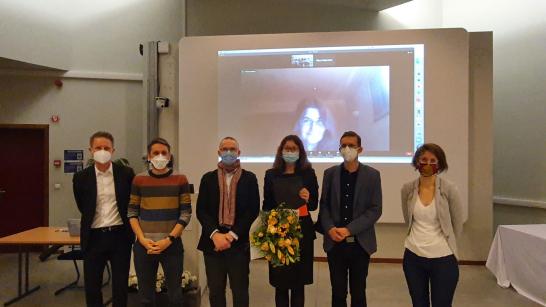
We are pleased to announce that on 20 January 2022, Diana Potjomkina successfully defended her PhD thesis entitled: “Multistakeholderism in the European Union’s Trade Policy-Making: Analysing Domestic Advisory Groups”. The PhD defence started with a welcome note by the Chair, Prof. Harri Kalimo (Brussels School of Governance). After her presentation, Diana answered questions from the jury which consisted of Prof. Maria Garcia (Bath University), Prof. Gaelle Dusepulchre (International Federation for Human Rights/ULB), Prof. Ferdi De Ville (Universiteit Gent), and Prof. Trisha Meyer, Ph.D (Brussels School of Governance, VUB). After that, Diana’s PhD Promotor Prof. Jamal Shahin (Brussels School of Governance, VUB) gave a speech reflecting on their excellent collaboration over the years. Finally, the PhD defence was concluded by Diana’s speech in which she thanked her supervisors, members of the jury, family and friends, for their support.
The Brussels School of Governance would like to congratulate Dr Diana Potjomkina on this achievement! Below you can read more about her PhD thesis.
 Abstract
Abstract
This dissertation is dedicated to multistakeholderism in European Union’s (EU) external trade policy, specifically focusing on the Domestic Advisory Groups operating in its implementation stage. Its overall research question is “How can we assess the EU’s approach to engaging stakeholders in its trade policy-making?” The dissertation offers several conceptual instruments for a critically informed analysis of stakeholder participation, encompassing both the formal provisions and actual practices. It further demonstrates how these conceptual instruments apply in practice through an in-depth empirical analysis of three cases: the European Union, Georgia, and Peru.
The dissertation is comprised by four journal articles. Articles 1 and 3 focus on assessing inclusiveness of the EU DAGs and the Georgian DAG. In turn, articles 2 and 4 look into the aspects of the DAGs that stakeholders do not consider legitimate. Article 2 analyses resistance of the EU DAG members to the setup of these mechanisms, and article 4 discusses the issue of meta-participation and the empirical case of the Peruvian “shadow DAG”.
The general conclusion from articles 1 and 3 is that the current setup of the DAGs is not favourable for horizontal nor for vertical inclusiveness, and the functioning of the DAGs shows that they have not been able to achieve a high level of inclusiveness in practice. The findings from article 2 and article 4 demonstrate that the DAGs analysed in these studies lack legitimacy in the eyes of many relevant stakeholders. Overall, on the basis of the conceptual tools developed in this dissertation and the four empirical studies, the conclusion is that so far, the DAGs have had only limited success in engaging civil society stakeholders.
